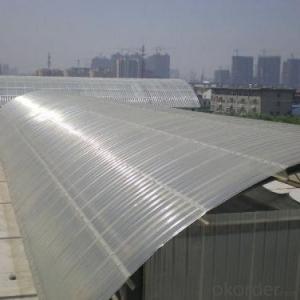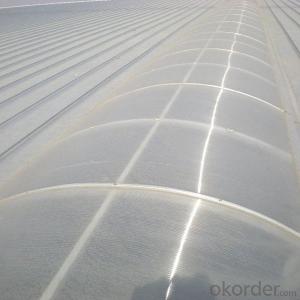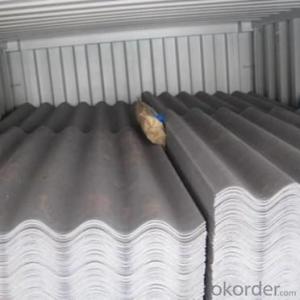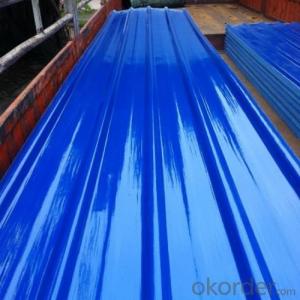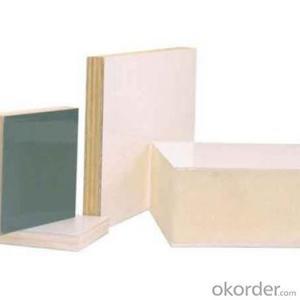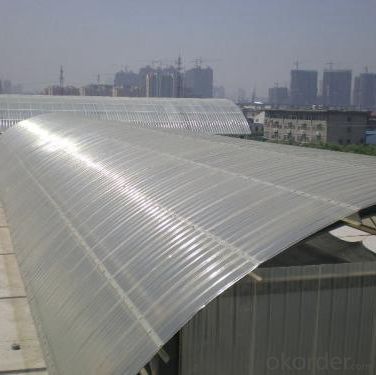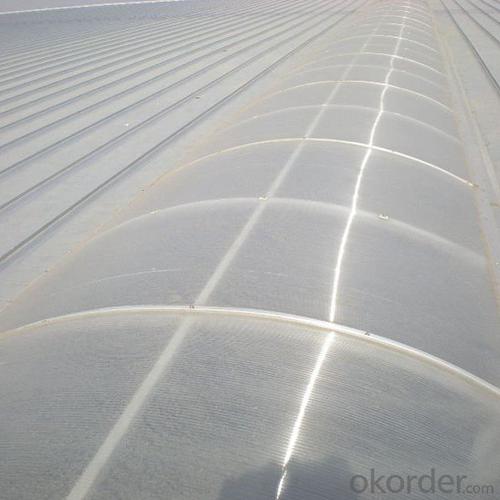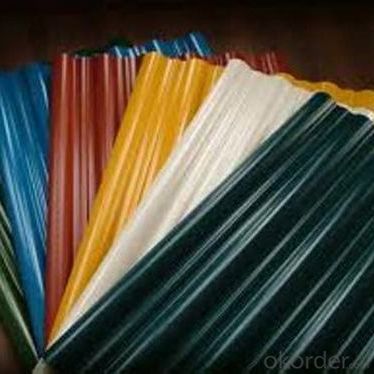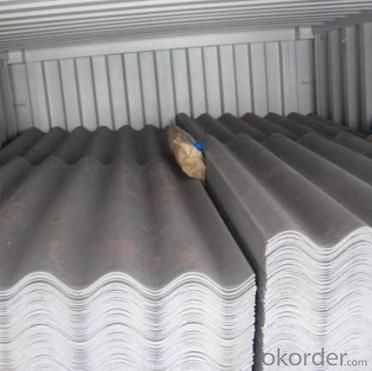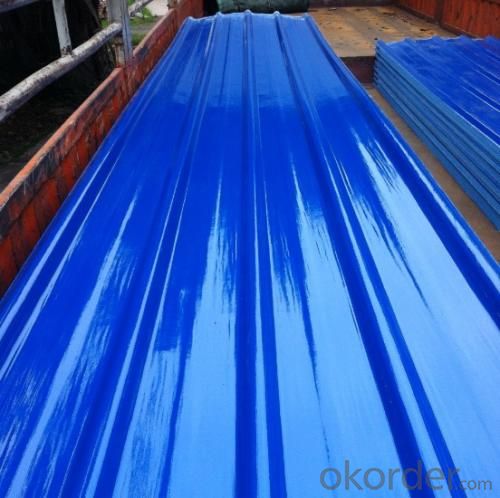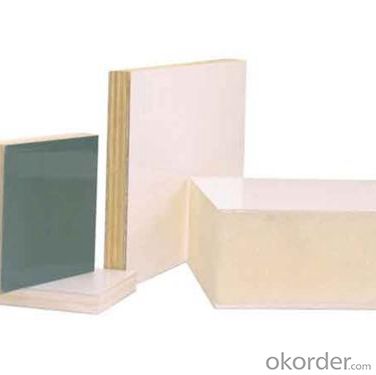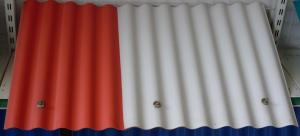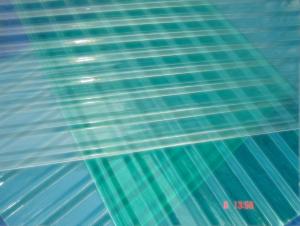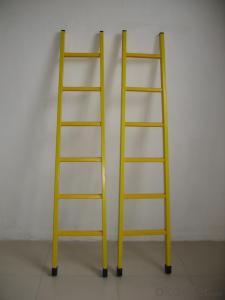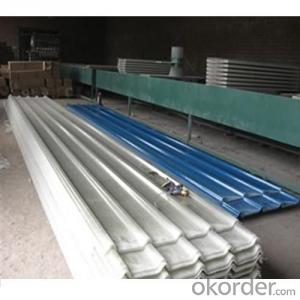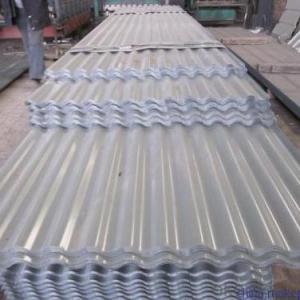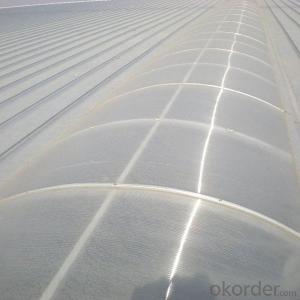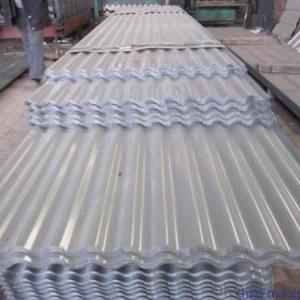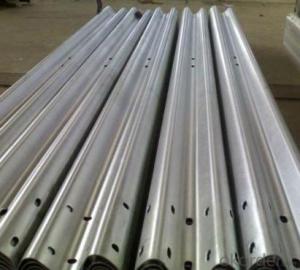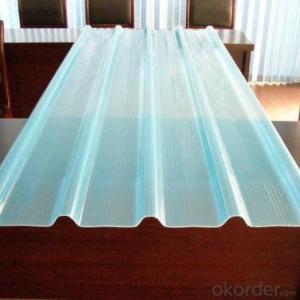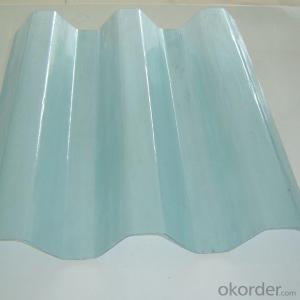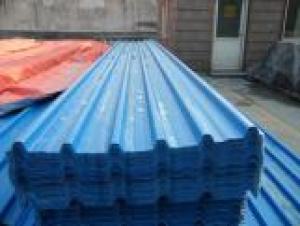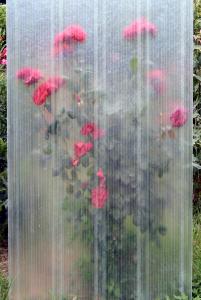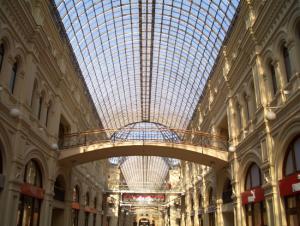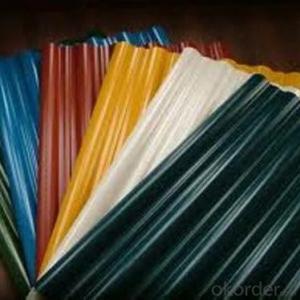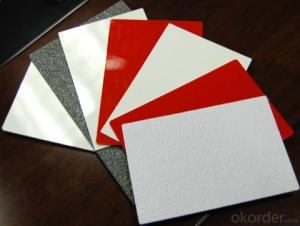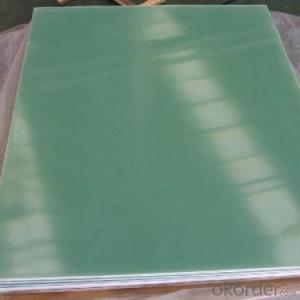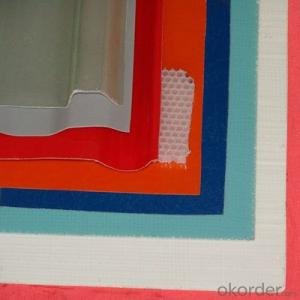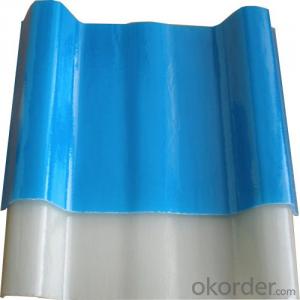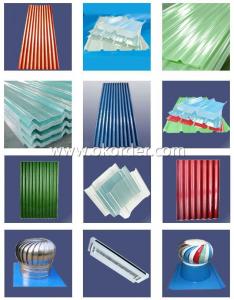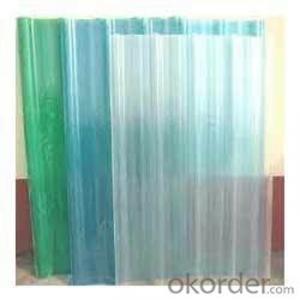Corrugated FRP GRP Roof Sheet for Roofing
- Loading Port:
- Tianjin
- Payment Terms:
- TT OR LC
- Min Order Qty:
- 400 m
- Supply Capability:
- 50000 m/month
OKorder Service Pledge
OKorder Financial Service
You Might Also Like
Specification
PRODUCT DESCRIPTION
FRP GRP Fiberglass Glassfiber Corrugated Roofing is a patent of our company, not like other FRP products, it is produced without yarn, instead, we use mat only. Therefore, the corrugated sheet is more strong in both horizontal and vertical direction.
Fiberglass corrugated sheet is usually used in construction site as protecting facility. It is dagarous for workers in building site since you never know if there is something hard drop down from the high area. So corrugated sheet is installed for preventing the stuff dropping down to hurt people.
Besides, it could also applied as the roof of the constructions.
FEATURES
1). Light Transmission: The light transmission of FRP roof sheet is between 3%-85%. Light through FRP corrugated sheet scatters and is mild. It will not form a light so as to make the indoor brighter.
2). Weather resistant: The UV agent mixing in the corrugated sheet, which can truly resist the damage of ultraviolet ray, which can truly resist the damage of ultraviolet ray.
3). Flame retardant: B1 grade.
4). Anti-corrosion: It resists chemical corrosion and its life span is over 3 times longer than zinc panel.
5). Water proof:100% water proof.
6). Impact capacity: resist impact, tensile and hardly breakable.
7). Light weight: the weight is light, etc
SPECIFICATION
| Fiber | E-glass chopped strand mat |
| Resin | Unsaturated polyester |
| Fiber content | 31.50% |
| Thickness | 1.2/ 1.5/ 2.0mm(±10%) |
| Transparent Rate | 30%-90% |
| Length | No limit |
| Gel coating | 150um |
| Warranty | 15/ 25years |
PICTURES
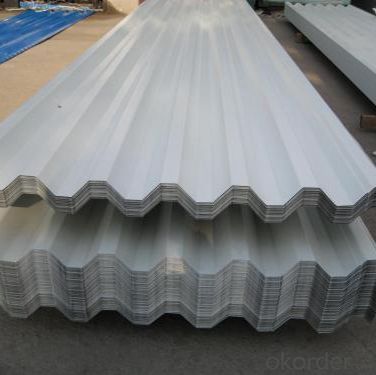
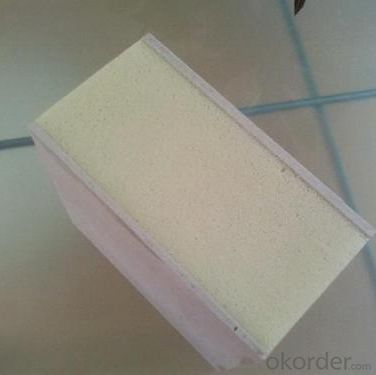
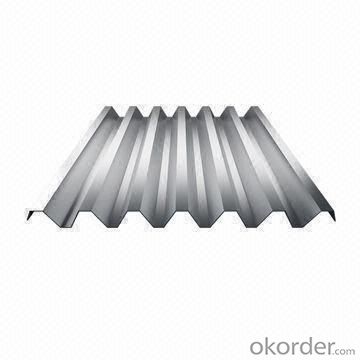
- Q: Can FRP roofing panels be used in areas with high levels of air pollution?
- Yes, FRP (Fiberglass Reinforced Plastic) roofing panels can be used in areas with high levels of air pollution. FRP panels are known for their durability and resistance to various environmental factors, including air pollution. They are designed to withstand harsh conditions and are often used in industrial and commercial settings where air pollution levels can be high. Additionally, FRP panels are non-reactive, meaning they do not corrode or degrade when exposed to chemicals or pollutants in the air. Therefore, they can be a suitable choice for areas with high levels of air pollution.
- Q: Can FRP roofing panels be used in renovation projects?
- Yes, FRP (Fiberglass Reinforced Plastic) roofing panels can definitely be used in renovation projects. FRP panels are known for their durability, strength, and resistance to various weather conditions, which makes them an excellent choice for roofing applications. They can be installed on various types of structures, including residential, commercial, and industrial buildings. In renovation projects, FRP roofing panels can be used to replace old or damaged roofs, providing a cost-effective and long-lasting solution. They are lightweight and easy to install, which can help expedite the renovation process. Moreover, FRP panels come in a variety of colors, finishes, and profiles, allowing for customization to match the design and aesthetic requirements of the project. Another advantage of FRP roofing panels is their low maintenance requirements. They are resistant to corrosion, rot, and UV damage, making them suitable for long-term use. Additionally, FRP panels offer good insulation properties, helping to regulate temperature and reduce energy costs. Overall, FRP roofing panels can be a great choice for renovation projects due to their durability, ease of installation, customization options, low maintenance needs, and energy efficiency. They offer a reliable and attractive roofing solution, ensuring the longevity and improved functionality of renovated structures.
- Q: Can FRP roofing panels be customized to fit specific roof shapes?
- FRP roofing panels have the capability to be tailored to fit specific roof shapes, allowing for a seamless installation on roofs with unique angles, curves, or slopes. These panels are highly versatile and can be molded or cut to suit various roof shapes and sizes. Moreover, they can be easily trimmed on-site to achieve a precise fit to the specific dimensions of the roof. This customization feature makes FRP roofing panels a favored option for both residential and commercial purposes, as they can be customized to meet the specific requirements and aesthetic preferences of any roof shape.
- Q: Do FRP roofing panels require a specific type of underlayment?
- Yes, FRP (Fiberglass Reinforced Plastic) roofing panels typically require a specific type of underlayment. This underlayment acts as a barrier between the panels and the roof structure, providing additional insulation, moisture resistance, and protection against potential leaks. The specific type of underlayment required may vary depending on factors such as the climate, building codes, and manufacturer recommendations, so it is essential to consult the manufacturer or a roofing professional for the best underlayment choice for FRP roofing panels.
- Q: Are FRP roofing panels cost-effective?
- FRP roofing panels are considered cost-effective for a variety of reasons. Firstly, they are highly durable and have a long lifespan, resulting in minimal maintenance and replacement needs. This significantly cuts down on long-term repair and replacement costs. Moreover, FRP panels are lightweight and easy to install, leading to reduced labor expenses during installation. Their lightweight nature also makes transportation more economical, as it requires less fuel and manpower. Additionally, FRP roofing panels provide excellent thermal insulation, helping to lower energy consumption and decrease heating and cooling expenses. This can lead to substantial savings on utility bills over time. Furthermore, FRP panels are resistant to corrosion, UV rays, and other environmental factors. This means they do not easily deteriorate, reducing the need for frequent repairs or replacements. In conclusion, although FRP roofing panels may have a slightly higher initial cost compared to traditional materials, their long-term cost-effectiveness, thanks to their durability, low maintenance requirements, energy efficiency, and environmental resistance, make them a worthwhile investment.
- Q: Can FRP roofing panels be used in zoos or animal enclosures?
- Yes, FRP (Fiberglass Reinforced Plastic) roofing panels can be used in zoos or animal enclosures. FRP panels are a popular choice for roofing solutions due to their durability, strength, and resistance to various environmental conditions. They are lightweight, easy to install, and have excellent weatherability, making them suitable for outdoor applications such as animal enclosures. FRP panels are also resistant to corrosion, moisture, and UV radiation, which are important factors to consider when housing animals. They provide a protective barrier against harsh weather elements, ensuring the safety and comfort of the animals. Furthermore, FRP panels can be customized to fit specific enclosure requirements, including size, shape, and color. This flexibility allows zookeepers to create enclosures that mimic the natural habitat of the animals, promoting their well-being and overall health. Additionally, FRP panels are non-toxic and easy to clean, which is crucial for maintaining hygiene in animal enclosures. They can be easily washed and disinfected, preventing the growth of bacteria and ensuring a safe environment for both the animals and the zookeepers. In conclusion, FRP roofing panels are an excellent choice for use in zoos or animal enclosures. Their durability, resistance to environmental conditions, and customizability make them suitable for creating safe and comfortable habitats for a variety of animals.
- Q: Are FRP roofing panels available in different sizes?
- FRP roofing panels can be found in various sizes, catering to different project needs. FRP, which stands for fiberglass reinforced panels, are widely chosen for roofing applications because of their strength, ability to resist corrosion and UV rays. These panels come in a range of dimensions, from small panels spanning a few feet in width and length to larger ones that can reach several feet in width and up to 20 or 30 feet in length. The variety of sizes available allows for easy installation and ensures that FRP roofing panels can be utilized in a multitude of structures and projects.
- Q: Are FRP roofing panels suitable for industrial buildings?
- Yes, FRP (Fiberglass Reinforced Plastic) roofing panels are indeed suitable for industrial buildings. FRP panels are known for their durability, strength, and resistance to various weather conditions, making them an excellent choice for industrial structures. These panels are lightweight, yet sturdy, which allows for easy installation and reduced structural load. Additionally, FRP roofing panels offer excellent thermal insulation properties, which can contribute to energy efficiency in industrial buildings. They are also resistant to corrosion, chemicals, and UV radiation, ensuring a long lifespan and low maintenance requirements. Overall, FRP roofing panels are a reliable and cost-effective solution for industrial buildings, providing durability, weather resistance, and energy efficiency.
- Q: The difference between glass fiber reinforced daylight tile and PC endurance board
- The main constituents of glass are sand, quartz, and silica silicates. Many roofing materials use glass fiber to increase strength.
- Q: Are FRP roofing panels prone to cracking from heavy loads?
- No, FRP roofing panels are not prone to cracking from heavy loads. They are highly durable and have excellent load-bearing capabilities, making them suitable for withstanding heavy loads without cracking.
Send your message to us
Corrugated FRP GRP Roof Sheet for Roofing
- Loading Port:
- Tianjin
- Payment Terms:
- TT OR LC
- Min Order Qty:
- 400 m
- Supply Capability:
- 50000 m/month
OKorder Service Pledge
OKorder Financial Service
Similar products
Hot products
Hot Searches
Related keywords
